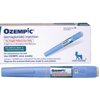Fritextsökning
Artiklar per år
Innehållstyper
-

We desire talent to come here, but are we genuinely welcoming them?
Sweden faces significant challenges in creating a truly inclusive environment that makes international professionals feel welcome, valued, and able to build meaningful careers, writes Sarah Lidé in a column.
-

FDA utökar användningsområdet för Ozempic
FDA har godkänt Ozempic som den första GLP-1-analogen att minska risken för försämrad njursjukdom.
-

Large study: The benefits and risks of obesity medications
Medications such as Ozempic can reduce the risk of a range of different diseases and health conditions but also increase the risk of others. This is according to a large American study where the connections between GLP-1 receptor agonists and the risk of a variety of health outcomes have been examined.
-

Jättestudie: Fördelarna med fetmaläkemedel – och riskerna
Läkemedel som Ozempic kan minska risken för en rad olika sjukdomar och hälsotillstånd, men också öka risken för andra komplikationer. Det enligt en stor amerikansk studie där kopplingar mellan GLP-1-analoger och risk för en mängd olika sjukdomar undersökts.
-

He takes over the chairmanship of Karolinska Development
Ben Toogood is appointed as the new chairman of Karolinska Developments.
-

How the Foreign Office will promote Swedish life science exports
The broadness and innovative strength keep Swedish life science exports strong, but the protectionist tendencies in the world are worrying, says Camilla Mellander, Director General for Trade, in an interview.
-

Så ska UD främja svensk life science-export
Bredd och innovationskraft gör att svensk life science-export fortsätter att stå stark – men de protektionistiska tendenserna i omvärlden är oroande. Det säger Camilla Mellander, utrikesråd för handelsfrågor, i en intervju.
-

Life science trends 2025 – Part 1 obesity drugs
More obesity drugs are being launched this year following Novo Nordisk and Eli Lilly's previous successes with GLP-1 drugs. But the next big breakthrough in obesity has a different mechanism of action, writes Samuel Lagercrantz in the first article
-

New cell therapy raises hope for curing type 1 diabetes – "Never succeeded before"
For the first time, a patient with type 1 diabetes has undergone an islet transplantation using genetically modified insulin-producing cells that do not require immunosuppressive drugs. "A major immunological breakthrough," says Professor Per-Ola Carlsson, who leads the clinical study, to Life Science Sweden.
-

Anacardio går vidare med gynnsamma data och påfylld kassa
Solnabaserade Anacardio har säkrat 205 miljoner kronor i finansiering, och presenterar samtidigt positiva studiedata för sin läkemedelskandidat mot hjärtsvikt.
-

Trender inom life science 2025 – Del 1 fetmaläkemedel
Fler fetmapreparat är på väg efter Novo Nordisks och Eli Lillys framgångar med GLP-1-läkemedel. Men nästa stora genombrott inom obesitas har en annan verkningsmekanism. Det skriver Samuel Lagercrantz i den första artikeln i en serie med trendspaningar
-

Rise and Scantox cease conducting animal testing in Stockholm
Access to in vivo toxicology services is significantly decreasing in the Stockholm area as Rise shuts down animal testing and Scantox reorganizes. ”The costs are high, and demand is weak”, says the division manager at Rise to Life Science Sweden.
-

Novo Nordisk rasar på börsen efter resultat i fetmastudie
Det danska läkemedelsbolaget Novo Nordisk rasar med 21 procent på Köpenhamnsbörsen efter att bolaget aviserat huvudresultaten från en fas III-studie med den nya viktminskningsbehandlingen Cagrisema.
-

Novo Nordisk establishes new factory in Denmark
Novo Nordisk establishes a new production facility in Odense, Denmark, an investment of 8.5 billion Danish kroner.
-

Hypothesis testing versus conspiracy theory
"How do you know what is a conspiracy theory and what is a reasonable, scientifically based conclusion?" In a column, Ingrid Lönnstedt reflects on this question.
-

Partial court victory for entrepreneur who lost his company
Swedish life science entrepreneur Mikael Kubista has won the first round against a law firm that he, along with other co-owners, sued for negligent advice in connection with losing his company, Tataa Biocenter.
-

Joy at Egetis after positive CHMP opinion – ”The single most important milestone”
Stockholm-based Egetis Therapeutics has received a positive CHMP opinion for Emcitate, which could become the first approved treatment for the rare disease MCT8 deficiency."
-

Novo Nordisk miljardsatsar – etablerar ny fabrik i Danmark
Novo Nordisk etablerar en ny produktionsanläggning i danska Odense, en investering på 8,5 miljarder danska kronor (motsvarande cirka 13,2 miljarder svenska kronor).
-

Large study on milk: Risky for women but not for men
The risk of ischemic heart disease (IHD) and acute myocardial infarction (MI) increased for women with milk intake levels higher than 2 glasses per day, while no such association was found in men, according to a new large Swedish study.
-

Samuel Lagercrantz: ”Bolag i det fördolda får branschen att blomma”
Det finns en kategori företag som sällan står i rampljuset, men som sysselsätter många personer inom life science-sektorn och som har stor betydelse för branschen.
-

Anna Törner: ”If I fall seriously ill, I’ll move to Finland”
”It is both undignified and undemocratic that cancer patients must travel to Finland to uphold a façade of fairness that does not truly exist”, Anna Törner writes in a column.
-

Novo Nordisk to invest billions in new quality control lab
Novo Nordisk has announced plans to invest 2.9 billion Danish kroner in order to establish a new quality control laboratory in Hillerød in northern Zealand, Denmark.
-

Investigations against AstraZeneca: ”Chinese interests may be behind them”
Why are there several investigations against AstraZeneca employees in China right now? Life Science Sweden continues to seek answers.
-

Medivir CEO on upcoming study: ”It's about working together with others”
Medivir is a small company with a big task: to take its drug candidate, via extensive clinical studies, all the way to a patient group that currently lacks approved treatment alternatives. "We can't do that on our own – our entire R&D activities are about working together with others," says the company's CEO Jens Lindberg.
